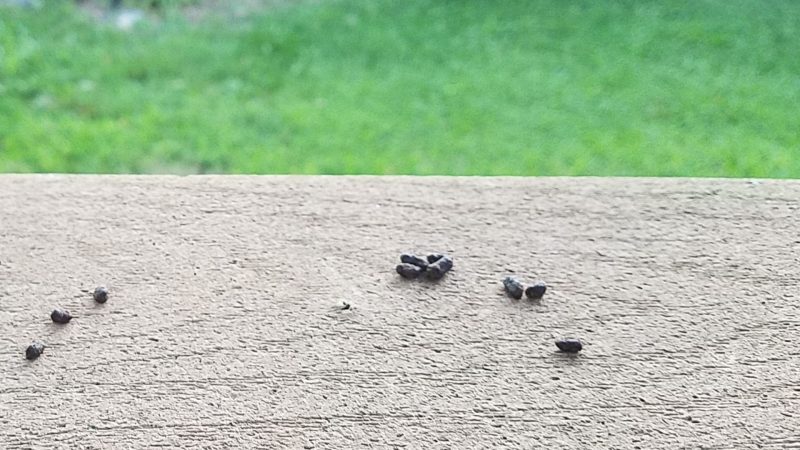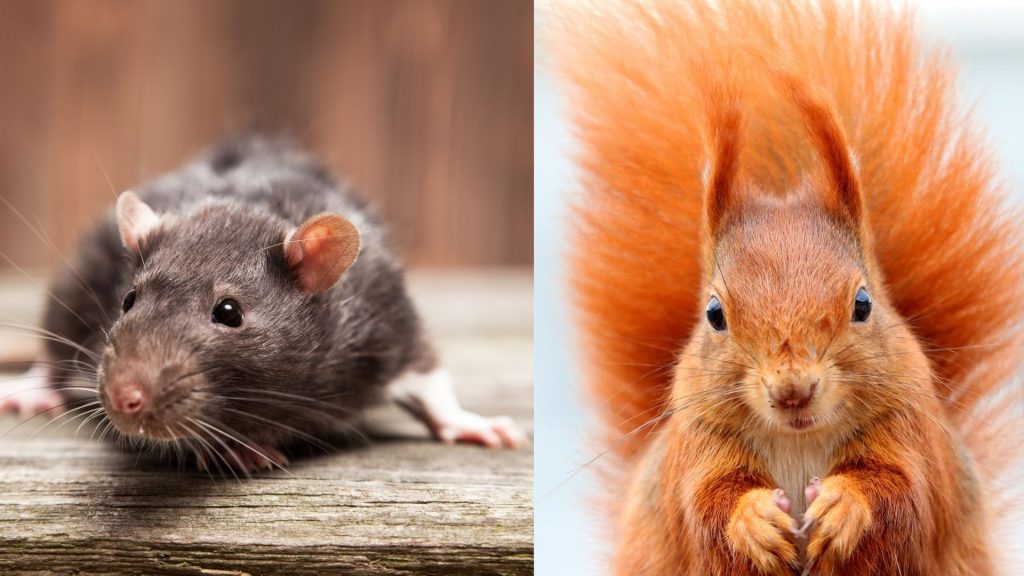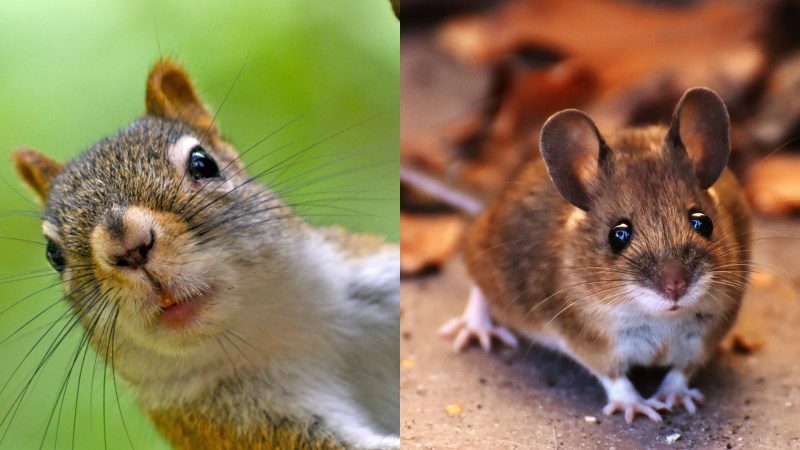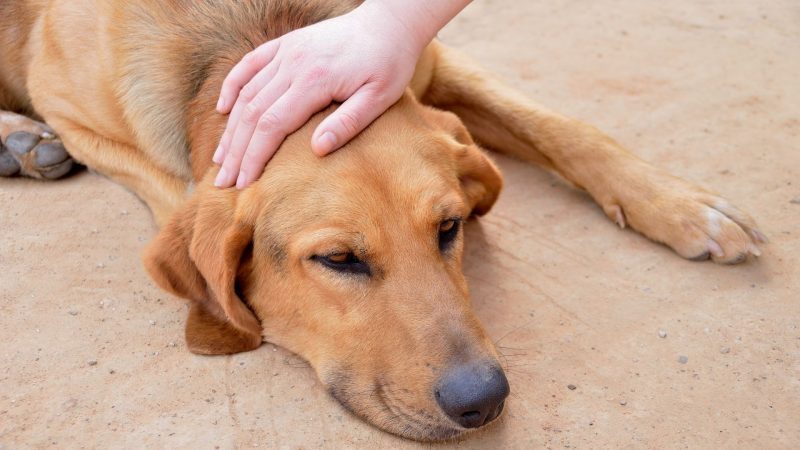You may find squirrels cute and attractive due to the adorable movie and television cartoon characters. But if you get to see their poop and realize its negative effects on humans, will there be a change to your perspective about them?
Can squirrel feces make you sick? Squirrel feces can make you sick. If you have direct contact with their poop, you can potentially get illnesses such as Salmonellosis, Leptospirosis, and Hantavirus Pulmonary Syndrome. Other potential diseases may include Tularemia, Lyme Disease, Rabies, tick, and flea infestation.
Now, we have acquired a background on the detrimental effects of squirrel droppings. The following sections will get you to know more about this famous rodent by discovering the effective ways in identifying their feces, their comparison to other kinds of poop, their smell, their consequences to other animals, and how to get rid of them.
Squirrel Feces Identification

What Does Squirrel Feces Look Like?
Squirrel feces usually appear to be large, thick, and round. Its color may range from light to dark brown but may also be dark to rusty red in some cases. It is frequently spotted in the crawling spaces of homes and business establishments, near bird feeders, or under trees.
How Big Are Squirrel Feces?
An average squirrel’s feces measures at least 3/8 to one inch in length and 1/8 inch in diameter.
What Does Squirrel Feces Smell Like?
The feces of squirrels may smell really strong and pungent. Its scent is similar to that of ammonia, especially when mixed with their urine.
Difference Between Rat and Squirrel Feces

Most of the time, the feces of squirrels are mistaken to be the excrement of rats due to their somewhat similar appearance. However, if you carefully observe both of them, you will notice some differences. These include the following:
- As to color: The droppings of squirrels are lighter in shade. Their feces are usually brown or dark red, while that of the rats is somewhat blackish.
- As to shape and size: The stool from squirrels has a barrel-like form and is usually bigger in size. On the other hand, rat poop has an oblong or slightly rectangular shape.
- As to edges: The feces of squirrels typically have soft and smooth edges while that of the rats are pointed and somewhat sharp.
- As to distribution: Rat droppings are usually clustered in groups and scattered in different areas, while the excreta from squirrels are most of the time inconspicuous and unnoticeable.
Squirrel Feces vs. Mouse Feces

Mouse feces are typically smaller than the poop of squirrels as it only has a size of 1/8 to ¼ inches. Also, mouse feces are thin, oblong, and dark brown to black in color, while squirrels are somewhat thick and lighter in the shade when freshly laid.
Can Squirrel Feces Make You Sick?
Yes, the feces of squirrels generally bring diseases to humans and animals. Thus, proper care and caution must be employed in handling it.
Is Squirrel’s Feces Dangerous to Touch or Breathe?
It is dangerous to touch or breathe the feces of squirrels as it has the potential to cause diseases that may bring complications and damaging effects to the body.
One of which is Leptospirosis, a bacterial infection that may affect humans if the cuts and breaks in your skin and mucous membranes are exposed to contaminated feces and urine. If no timely intervention is made, it may lead to liver failure, respiratory distress, kidney damage, meningitis, and eventually, death.
Another illness that causes health problems to humans when squirrel poop is inhaled or touched is the Hantavirus Pulmonary Syndrome. It is a disease that can be transmitted by direct contact with rodent droppings and inhalation of dust particles infected with the Hantavirus.
Other than that, it is also believed that the airborne particles from their feces could also trigger asthma attacks and allergic reactions in individuals having sensitivity to it.
Can Squirrel Feces Cause Joint Pain?
Squirrel feces do not necessarily cause joint pains. However, when a person is afflicted with diseases brought by exposure to their excreta, general muscle weakness, and body malaise may be experienced. This may somewhat affect the joints.
Diseases in Squirrel Feces
The following are the diseases that can be acquired from the feces of squirrels:
Leptospirosis
It is a bacterial infection caused by Leptospira. This disease afflicts both humans and animals and may be transmitted to them through contact with the squirrel’s feces and urine or contact with soil, water, and food contaminated with the latter.
Its symptoms may vary from high fever, chills, diarrhea, vomiting, and muscular pain but may progress to advanced stages such as meningitis, kidney failure, and liver damage.
Salmonellosis
It is a disease caused by the Salmonella bacteria. This can be transmitted to both humans and animals through contact with feces, food, water, and surfaces containing this infectious microorganism. The usual symptoms of this illness include fever, abdominal cramps, diarrhea, and vomiting, which usually resolve within five to seven days.
Hantavirus Pulmonary Syndrome
It is a respiratory disease brought about by Hantavirus. When rodents shed this microorganism on their feces, it can be passed on to humans when they inhale air or touch surfaces contaminated with the latter.
Early symptoms include fever, fatigue, and muscle soreness but may worsen to excessive coughing and shortness of breath. Thus, this viral disease can be fatal if not managed immediately.
What Happens if You Eat Squirrel Poop?

If you eat squirrel poop, you may contract diseases such as Leptospirosis, Salmonellosis, and Hantavirus Pulmonary Syndrome. This is possible if the droppings you ate were infected with the causative agents of the above-stated illnesses. Thus, it is not advisable to ingest or take in food particles contaminated with squirrel feces.
Is Squirrel Poop in the Attic Dangerous?

The presence of squirrel poop in your attic can be dangerous as this may signify squirrel infestation. When the movement of these rodents is not controlled, they may bring diseases and infections to your homes. Thus, it is imperative to carefully check their presence in attics and roofs to know if squirrels are lurking on them.
Related: How to Get Rid of Squirrels in Attic? | The Effective Guide
Can Squirrel Poop Make Dogs Sick?

Squirrel poop can make dogs sick if they ingest or have direct contact with food, water, and surfaces infected with the Leptospira and Salmonella bacteria. This is due to the fact that Leptospirosis and Salmonellosis can be passed on to animals.
How to Get Rid of Squirrel Feces?

In order to get rid of squirrel feces, you will need to eradicate squirrel infestation first. This can be done by checking and assessing attics, roofs, and other parts of your house where these rodents may live. You will know if there is a squirrel nesting in an area when you will find numerous droppings scattering all over the place or when you frequently hear jumping and loud noises inside it.
To deter their presence, you will need to close and secure the entry points of squirrels. If there are holes and damages on your attics or ceilings, it is advisable to cover them and replace them with materials that are difficult to penetrate. In this way, they would no longer return to these areas to excrete feces and cause damage.
How Do You Clean Up Squirrel Poop?
The following are the correct techniques for cleaning up squirrel droppings:
Step 1: Wear protective clothing and gear such as face masks, gloves, shoe covers, disposable suits, and plastic bags in cleaning up squirrel poop. Their feces may contain viruses and bacteria that may be transmitted to humans through direct contact and inhalation.
Step 2: Spray the feces with plain water and leave it for at least twenty minutes. This is to reduce the possible suspension of fecal particles in the air.
Step 3: In removing their poop, pick up the big ones first and put them in the plastic bag. To clean the rest of their feces, use a vacuum cleaner.
Step 4: To disinfect the area, you can utilize anti-microbial sprays or a mixture of bleach and water to deter any microorganisms that may be left behind.
Step 5: To remove the pungent smell brought by their excretions, you can spray the area with deodorizers that have anti-bacterial and anti-viral properties in order to purify and cleanse the air circulating in it.
Related: How To Get Rid of Squirrels? | Squirrel Control Methods
List of Sources
Diseases Directly Transmitted by Rodents. (2017). Centers for Disease Control and Prevention.
Gray Squirrel. (1999). Connecticut’s Official State Website – Department of Energy and Environmental Protection.
Learn About Squirrels. Commonwealth of Massachusetts.
Quinn, N., et al. (2018). Pests in Gardens and Landscapes: Ground Squirrel. Agriculture and Natural Resources, University of California – Statewide Integrated Pest Management Program.
- How to Get Rid of Copperheads | Practical Guide - August 27, 2023
- How to Get Rid of Corn Snakes | What Makes Them Aggressive? - August 27, 2023
- How to Get Rid of Alligators | Safety Measures and Removal Methods - July 16, 2023
